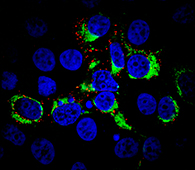Researchers find a new gene expression mechanism of PRRS virus, new disease prevention strategies now possible
Monday, May 12, 2014
MANHATTAN — A collaborative study involving Kansas State University researchers has discovered a new gene expression mechanism in porcine reproductive and respiratory syndrome, or PRRS, virus — an important swine pathogen that costs the U.S. pork industry more than $600 million a year. The discovery provides a new avenue for scientists to explore strategies to control and prevent the disease.
Ying Fang, Ph.D., associate professor of diagnostic medicine and pathobiology at Kansas State University, led a study that looked at the unique gene expression mechanism of the PRRS virus. She and colleagues found a new protein in the virus, nsp2TF, was generated through novel ribosomal frameshifting signals.
The research recently appeared in the Proceedings of the National Academy of Sciences, or PNAS, study, "Transactivation of programmed ribosomal frameshifting by a viral protein."
Fang conducted this study with her European collaborators, including Eric Snijder and his team members at Leiden University Medical Center in The Netherlands, and Andrew Firth, Ian Brierley and Brierley's lab members at the University of Cambridge. Yanhua Li, Fang's doctoral student in pathobiology, China, made important contributions to this study. Zhi Sun, Fang's former doctoral student, and Longchao Zhu, visiting scholars in diagnostic medicine and pathobiology in Fang's lab, also were involved in the study.
The study builds on a 2012 PNAS study Fang and her European collaborators conducted while she was at South Dakota State University. In it, researchers identified the nsp2TF protein in the PRRS virus. The protein is expressed through a new gene expression mechanism called -2 ribosomal frameshifting.
"Frameshifting occurs when a ribosome encounters a 'slippery' sequence and downstream signal in messenger RNA," Fang said. "This causes the ribosome to shift two nucleotides backward, which results in all the genetic codons downstream of the shifted site to be read differently and produce a new protein that has a different function."
With the most recent study, Fang and colleagues have shown that this -2 frameshifting requires a PRRS virus protein, nsp1beta. It is the first time a virus's genetic mechanism has been found to require the action of a transacting viral protein rather than a RNA structure to induce a ribosomal frameshifting, which is novel in the protein translation field.
The function of the nsp2TF protein is currently under investigation, Fang said. The protein contains a genetic element that may be responsible for suppressing the pig's immune system.
The newly identified ribosomal frameshifting mechanism may provide an additional antiviral target. Fang's research lab cloned the PRRS virus and then genetically engineered nsp2TF protein knockout viruses.
"These knockout viruses could be potentially used to develop vaccines," Fang said. "Additionally, this novel mechanism of gene expression may also be used by other viruses or in cellular gene expression."
Fang joined Kansas State University in 2013.
"Dr. Fang is recognized as one of the top PRRS experts in the world," said M.M. Chengappa, university distinguished professor of microbiology and head of the department of diagnostic medicine and pathobiology. "We are so fortunate to have faculty of her caliber and stature at Kansas State University. She brings enormous depth and breadth to our research and graduate training program."

